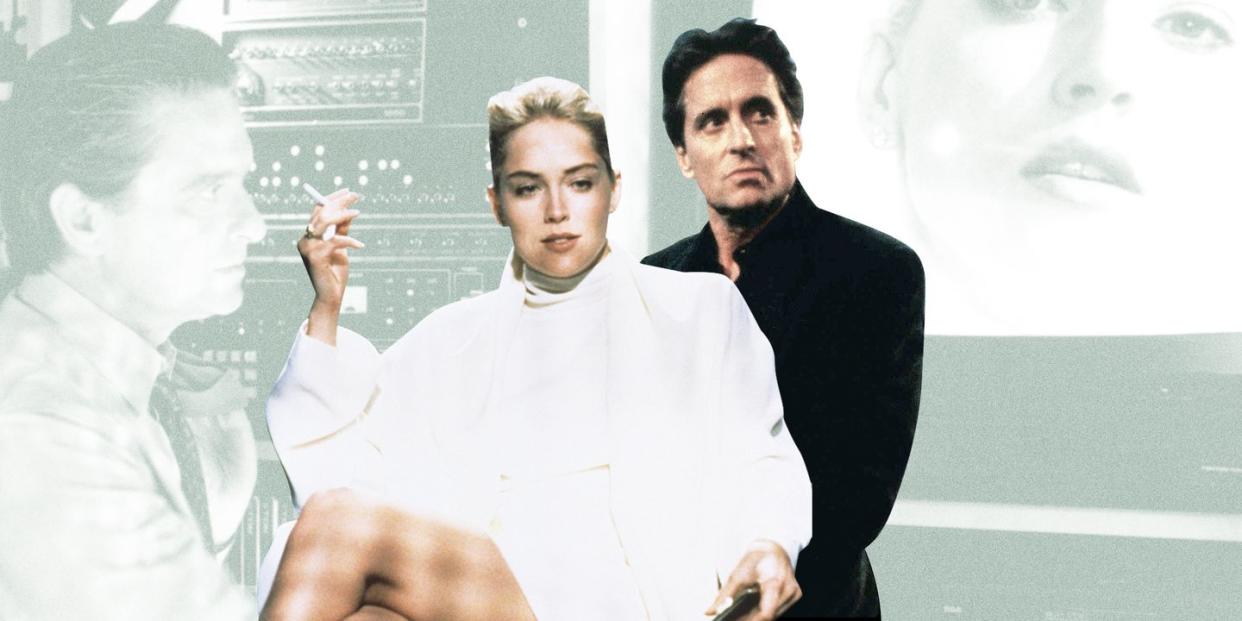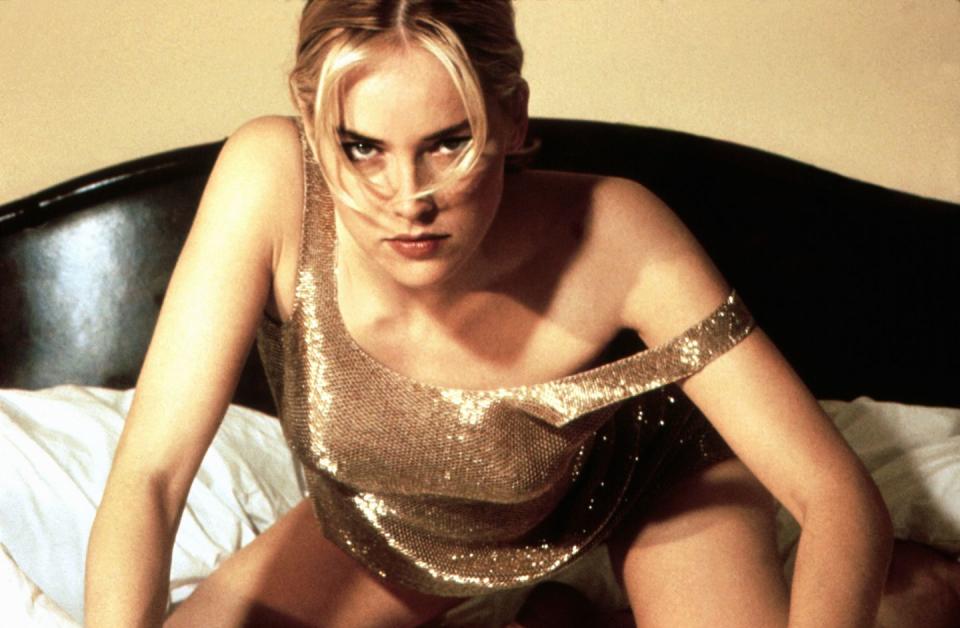Inside the Twisted Making of 'Basic Instinct'

- Oops!Something went wrong.Please try again later.
Back in the early ‘90s, when home-video was as critical to the bottom lines of Hollywood studios as streaming platforms are today, mom-and-pop VHS rental shops were as ubiquitous as Starbucks locations. If you were a teenage movie nerd back then, you figured out pretty quickly that the layouts of these stores were all pretty much the same, whether they were in Tampa or Tempe. Upon walking in the front door, you would be met by a rack of new releases. Behind that were rows divided by genre (drama, romance, foreign, sci-fi, action, horror, etc.). Finally, at the farthest end of the store was a beaded curtain leading to the adult section—a dimly-lit grotto boobytrapped by hanging windchimes that announced to the management (and everyone else in the store, including quite possibly your parents’ friends) that you were trespassing into a taboo underworld you weren’t supposed to visit. Those bells scared the hell out of me. Like a good boy, I stayed away. But there was one last row of alphabetized tapes that usually stood right in front of that beaded curtain: the “erotic thriller” section. It was like a softcore Maginot Line demarcating the border between reputable movies and disreputable ones. In those days, it called to me like a siren’s song.
Thirty years ago, the erotic thriller was at the apex of what would be a relatively short-lived, albeit glorious, golden age. And every week, those shelves seemed to groan a little louder under the collective weight of all of the titillating new titles being churned out by shlocky straight-to-video companies chasing the skin-and-sin bubble before it would eventually burst. These movies were ostensibly made for married couples looking to spice things up on a Saturday night, but in reality they were mostly rented by the target-rich demographic of horny, drooling teenagers like myself. More often than not, they starred such genre mainstays as Shannon Whirry, Shannon Tweed, and Tanya Roberts. For some reason, the male lead always seemed to be played by Andrew Stevens. And while we’ll put a pin in a deeper dive into that seedy little Hard-R cinematic alleyway for another time, what interests me right now is the fact that the erotic thriller genre wouldn’t exist—or at least would never have thrived like it did—were it not for another film that came out 29 years ago this month, Paul Verhoeven’s Basic Instinct.
If Basic Instinct was only responsible for the kudzu-like proliferation of the erotic thriller genre, it would still be noteworthy. But the truth is, the story behind the making of Verhoeven’s naughty neo-noir is far more interesting than just that one lurid footnote. It also marked the height of the era’s seven-figure spec-script boom; the last real triumph for the profligate, cash-crazy studio Carolco; a brilliant star-is-born performance that turned out to be rooted in male-gaze betrayal; and a source of outrage for the LGBTQ groups that feels like a dress rehearsal for where we are today.
The story begins as all stories do, with a writer. In this case, Joe Eszterhas—a macho, leonine-maned, former investigative reporter for Rolling Stone who, in 1978, segued into screenwriting with the Sylvester Stallone movie F.I.S.T. The movie bombed. But soon the hits would keep coming: Flashdance, Jagged Edge, Music Box. As Eszterhas’ star was rising, so too were the fortunes of an independent movie studio called Carolco, which was led by two free-spending producers named Andrew Vajna and Mario Kassar. Like Golan and Globus but with way deeper pockets, Vajna and Kassar were bigger-than-life immigrants with a Barnumesque sense of showmanship. They would first hit paydirt with 1982’s First Blood, starring Stallone as the scarred Vietnam vet, John Rambo. Two blockbuster sequels would follow, as would hand-over-fist red-meat hits like Total Recall, Terminator 2: Judgment Day, and Cliffhanger. Thanks to the duo’s lavish parties at Cannes, liberal private-jet loaner policy for its talent, and willingness to outspend the more tight-fisted Tinseltown majors when it came to salaries (not to mention a foreign-sales distribution blueprint that put their movies in the black before even a foot of film was shot), Carolco became an unstoppable juggernaut in the industry—as well as an existential threat. At least, until it became clear that their business model was built on over-leveraged quicksand.
Before that would happen, though, no one was quicker on the draw with their checkbooks than Vajna and Kassar. So when Eszterhas pitched his idea for Basic Instinct around town, it was never a question of who would win the bidding war, just how many zeroes would be attached. In the end, the screenwriter would pocket $3 million for Basic Instinct—a script he wrote in 13 days. At the time, no one batted an eye. After all, this was the early ‘90s and the bulls were running in the Wild West spec-script market. Writers like Eszterhas and Lethal Weapon’s Shane Black were routinely pulling in seven figures for any half-baked idea they scribbled onto the back of a bar napkin at Spago.
With Eszterhas’ script in hand, Carolco tapped Paul Verhoeven to direct a twisty, Hitchcockian murder mystery turbo-charged with gratuitous dollops of ice-pick violence, nudity, drugs, and sex. Verhoeven was an obvious choice for the studio. After all, he had just directed Total Recall for the studio. Between that and 1987’s RoboCop, the Dutch director had proven himself as someone who could tap-dance on the fine line between the straight-faced and satire. He could revel in the outre and poke fun at it simultaneously. If anyone could thread the needle on a whodunit as winkingly tawdry, overheated, and preposterous as Basic Instinct, it was him.

Vajna and Kassar signed Michael Douglas to play the lead—a hot-headed San Francisco police detective and recovering addict named Nick Curran. With recent hits like Romancing the Stone, Fatal Attraction, War of the Roses, and his Oscar-winning turn in Wall Street still fresh, Douglas was a huge box-office draw whose handsome price tag Carolco was more than ready to meet. As for the role of Catherine Tramell, the lethally seductive mystery writer who becomes the prime suspect after her rock-star lover is murdered mid-climax and turned into a gruesome pin cushion, the studio offered the part to a Who’s Who of the era’s biggest actresses—Kim Basinger, Meg Ryan, Michelle Pfeiffer, Geena Davis, Ellen Barkin…the list goes on. They all reportedly passed. Verhoeven then reached out to an actress who had recently knocked him out in the small-but-crucial role of Arnold Schwarzenegger’s duplicitous wife (or was she?) in Total Recall, Sharon Stone.
By the time Basic Instinct came around, Stone’s career was in idle. In fact, this is how she puts it in a recent excerpt in Vanity Fair from her forthcoming memoir The Beauty of Living Twice:
Basic Instinct was my 18th movie. For years, I had been getting pummeled doing a bunch of crap movies and so-so television, back in the day when TV wasn’t king. I was 32 years old when I got that job. I told my agent that if they got me in that door, I would get the job. I knew this was the last chance—I was aging out of the business I hadn’t really gotten into yet. I needed a break.
Basic Instinct made Stone an overnight sensation. And sitting down and watching the film again, it’s easy to see why. As Tramell, she’s smarter than Douglas, more confident, more calculating, and sexier. But most of all, you can see the character and the actress having a blast fucking with Douglas’ head. Unfortunately, at the time, many would unfairly credit Stone’s star-making turn to the film’s infamous interrogation scene, where her character toys with a roomful of leering, perspiring male cops. During the summer of 1992, all anyone could talk about was Stone’s blink-and-miss flash of pantylessness. But she would later say that shooting the scene made her feel exploited and duped.
Again, from The Beauty of Living Twice…
After we shot Basic Instinct, I got called in to see it. Not on my own with the director, as one would anticipate, given the situation that has given us all pause, so to speak, but with a room full of agents and lawyers, most of whom had nothing to do with the project. That was how I saw my vagina-shot for the first time, long after I’d been told, “We can’t see anything—I just need you to remove your panties, as the white is reflecting the light, so we know you have panties on.” Yes, there have been many points of view on this topic, but since I’m the one with the vagina in question, let me say: The other points of view are bullshit.
Verhoeven has denied Stone’s version of events. But it’s hard not to buy her version of the story. It sounds exactly like the kind of thing that would happen on a Hollywood movie set in 1992. Or 2002. Or 2012. Nor was the he-said/she-said leg-crossing scene the only tinderbox that Basic Instinct would set a match to. While the film was being shot in San Francisco, several LGBTQ activist groups had gotten their hands on the script and were outraged at how it portrayed Tramell’s bisexual character as a sociopathic serial killer. Hundreds of irate demonstrators flocked to the film’s set to picket and protest, blowing whistles when the cameras started rolling.
Despite the controversy—or perhaps, in part, because of it—when Basic Instinct hit theaters in late March of 1992, audiences swarmed to see what all the fuss was about. Reviews from many male critics who could barely disguise the wagging tongues that hung so low they were in danger of getting caught in their typewriters didn’t exactly hurt business either.
Basic Instinct would rake in $352 million worldwide by the end of its run, making it one of the best bets in Carolco history. With 30 years of hindsight, it's finally possible to look at the film and see more than just its notorious interrogation scene. It's a first-rate torrid thriller that treats sexuality—specifically female sexuality—with an unapologetic matter of factness rare for its time. Stone's Tramell isn't just some hardboiled pulp femme fatale, she's a woman whose agency belongs solely to her and her alone (a fact of the character that stings given how Stone was treated on set). Today, that would count as something rare; in 1992, it was downright revolutionary, which probably explains not only why the film pushed so many buttons at the time, but also why Stone instantly became a new kind of Hollywood star—a symbol of cool feminine power. You can draw a direct line between her portrayal in Basic Instinctto Demi Moore's in Disclosure, Linda Fiorintino's in the Last Seduction, Rosamund Pike's in Gone Girl, and Carey Mulligan's in Promising Young Woman.
In spite of its box office success with Basic Instinct, Carolco's luck wouldn’t last. Within three years, the company would file for Chapter 11 bankruptcy thanks, in large part, to the Geena Davis-Matthew Modine maritime disaster Cutthroat Island. As for Stone, she would instantly become the most in-demand actress in Hollywood (at least for the kinds of parts that America’s Sweetheart Julia Roberts would never be up for). Michael Douglas kept right on being Michael Douglas. And Eszterhas would keep pocketing millions for films of diminishing worth (Sliver, Jade, and Verhoeven’s Showgirls) before doing a slow fade-out from the business. As for the erotic thriller section next to the beaded curtain at your local video store, for a little while longer business would never be better.
You Might Also Like

